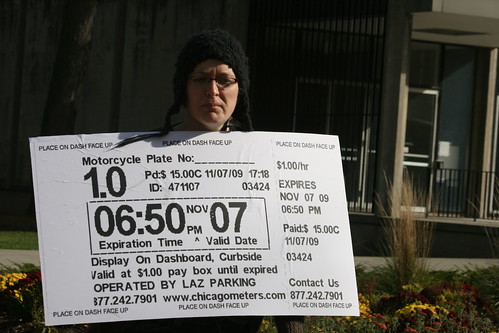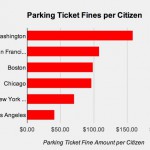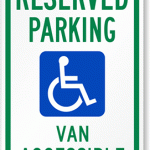Should private companies issue parking tickets?
Since 2010, LAZ Parking’s private officers have been writing thousands of tickets for parking violations in Chicago. Hired by the city’s private concessionaire, Chicago Parking Meters, LAZ parking has managed to raise over 15 million in revenue to date, leaving some to wonder if there is more than meets the eye.
In 2008, Chicago Parking Meters (CPM) took over the operation of 36,000 public parking meters for an up-front payment of $1.2 billion to the cash-strapped city. Since then, it has managed to recover much of its initial investment– through hiked prices and increased hours of enforcement. According to Alderman Scott Waguespack — one of the few council members who opposed the 75-year contract — CPM needs less than ten years before it can sit back and enjoy pure profits for the remaining 60 years. The private consortium that owns CPM (consisting of financial giant Morgan Stanley, Abu Dhabi Investment Authority, and Allianz Capital Partners) stands to earn $9.58 billion in profit, according to Bloomberg BusinessWeek. The tightly written clauses have ensured the private consortium never stops making money during its term.

A Chicago resident dresses up as LAZ Parking-enforced ticket on Halloween. Image by Quinn Dombrowski.
Private parking enforcement means selling police power to corporations
Besides putting Chicago taxpayers in a fix by leasing public assets for a fraction of their worth, the deal also forced the city to hand over police power to private corporations. Thomas Geoghegan, practicing attorney and author of several books tells The Nation, “…A seventy-five-year-agreement to run parking meters is an unconstitutional restriction on the police power — the sovereign right of the city to control its public streets and ways…. This is a very traditional, conservative, really, argument: what the City of Chicago did was not sell the meters. They sold the police power of the city.”
The practice of taking parking tickets from a private contractor doesn’t sit well with residents of other cities, either. Nguyen of San Diego, who received a parking ticket from a private parking enforcement, says, “It feels wrong to get the ticket… because I don’t like the idea of private companies handing out citations like they’re public authorities. I don’t think most people would.”
Lawlessness prevails when private parking management works to meet yearly quotas
In Los Angeles, California, where Xerox State and Local Solutions handles the city’s parking, residents complained last year that the company rejected many appeals to contest their parking tickets. LA Times reports, “the company has been trying to keep more parking revenue by stonewalling attempts to fight tickets.” City data reflects that Xerox has been rejecting many appeals.
The abuse of law enforcement power isn’t limited to the U.S., either. To increase revenues that had slumped last year, NSL, the UK’s biggest parking contractor, asked its partners and staff to increase their ticket issuing rates. The civil enforcement officers admitted to BBC that they “submitted fraudulent photographic evidence and fabricated evidence in pocket books to help increase the number of penalty charge notices (PCNs) issued.”
To some, private parking enforcement is just more efficient
Even though there are plenty who oppose privatized parking, either for its malpractices or its erroneous issuing of tickets (ParkAtlanta, anyone?), there are others who think it doesn’t matter who hands out the tickets, as long as they do their job well. Private parking enforcement officers are just as capable of spotting a violation and writing a ticket, since they go through the same training procedure laid out by the city.
Private companies can also afford to hire more people to take over daily operations, something cities with their restricted budgets cannot accomplish — at least not instantaneously. Cincinnati, for example, loses almost $9 million a year in parking revenue due to understaffing, plus problems like broken meters and outdated technology.
Private parking enforcement doesn’t seem a big deal at a time when anyone can become a parking enforcement officer anyway. Apps like SpotSquad encourage people to snap photos of parking violations they witness and send them to the police or private parking operators. If the violation results in a fine, informants get a cut deposited into their bank accounts or a charity of their choice.
Related Posts
Category: Regulations




















